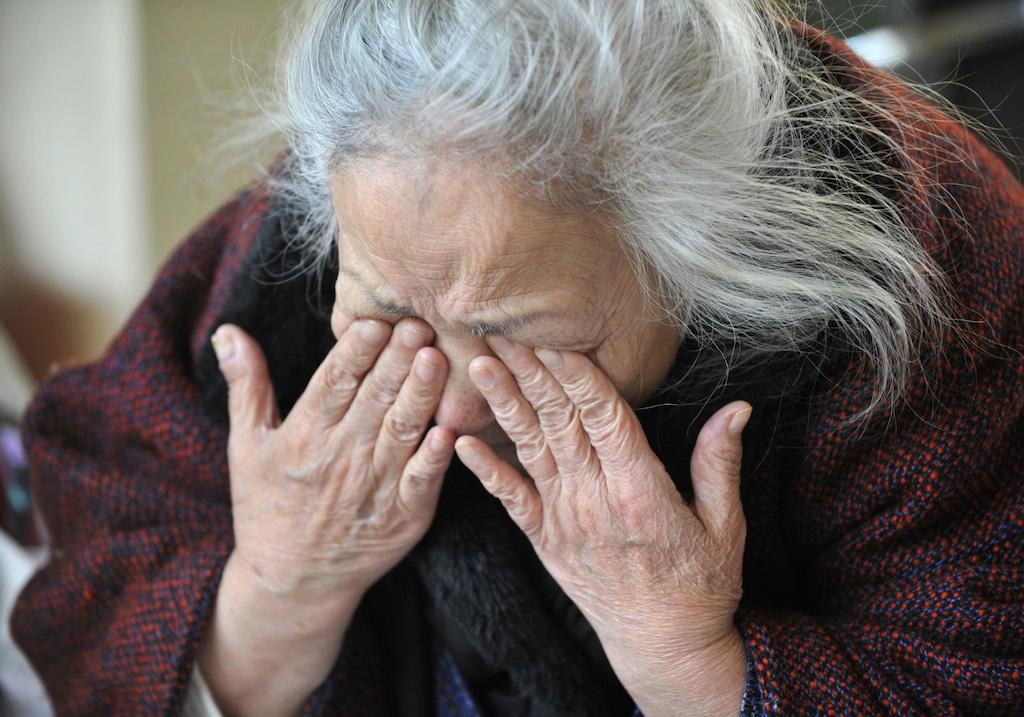Japan to decommission disaster-hit Fukushima reactors (UPDATES)
Tsuyako Ito wipes away tears during an interview at a shelter in Kamaishi, Iwate prefecture, Japan, on March 25, 2011. The “last geisha” of this once-bustling steel city says she lost everything from her kimono to music instruments as a tsunami swept them away.
Japan said Wednesday it is to decommission reactors at its disaster-hit Fukushima nuclear plant and overhaul nuclear safety procedures after admitting serious failings in its battle to contain dangerous levels of radiation.
Power plant operator Tokyo Electric Power Co (TEPCO) — whose president Masataka Shimizu has been hospitalized with high blood pressure and dizziness — said the shutdown of four damaged reactors was inevitable.
Japan's Trade Ministry, responsible for the safety of the country's expanding nuclear energy program, said in a statement that tougher new regulations would be drafted to in the wake of the earthquake and tsunami that triggered the world's worst atomic crisis since the 1986 Chernobyl explosion.
The latest steps came as France and the United States pitched in to help Japan in its efforts to bring Fukushima under control amid fears over rising radiation levels detected outside the plant.
French President Nicolas Sarkozy plans to visit Tokyo Thursday, making him the first foreign leader in the country since the March 11 earthquake and tsunami that triggered a massive humanitarian crisis and nuclear accident.
France, which produces three-quarters of its power from nuclear reactors, also flew in two nuclear experts to assist Japan's plant operator, TEPCO, Reuters reports. TEPCO has come under heavy criticism for its slow response to the incident and safety lapses.
The United States will send radiation-detecting robots to help Japan explore its reactor cores and spent fuel pools, it states.
New readings show the seawater near Japan's Fukushima Dai-ichi plant to contain radioactive iodine at 3,355 times the legal limit, according to the Japanese nuclear safety agency. Earlier testings put the water's radioactive iodine at 1,850 times the legal limit, BBC reports.
However, the agency played down the impact of the findings Wednesday, saying people had already left the area and no fishing was taking place there.
The spike in radioactive iodine in the sea comes a day after officials found the radioactive substance plutonium seeping into the soil near the plant. It remains unclear where the higher levels of plutonium had come from, and experts believe at least some may have come from spent fuel rods at the plant or damage to one of the reactors.
Japan has been working for weeks to get a handle on its crippled power plant, which was damaged during the earthquake and tsunami that devastated much of the country and left 27,000 people either dead or missing.
While the government offered strong assurances last week that significant progress had been made to bring power back to the plant and restart its cooling systems, this week that confidence has slipped away, the New York Times reports.
Prime Minister Naoto Kan, who has come under criticism for his handling of the crisis, gave his most sober message yet on the developments in an address to Parliament on Tuesday.
“The earthquake, tsunami and the ensuing nuclear accident may be Japan’s largest-ever crisis,” he said. “We find ourselves in a situation where we can’t let down our guard. We will continue to handle it in a state of maximum alert.”
Japanese workers at the plant now face a difficult choice between continuing to douse the plant's stricken nuclear reactors with water to keep them cool, and preventing the possibility of highly radioactive water that has flooded the reactors from spilling into the ocean, the Wall Street Journal reports.
"At the heart of the day's moves lies a calculated choice between bad and worse: To meet their goal of keeping reactors cool enough to forestall catastrophe, officials appear willing to risk letting some highly radioactive water spill out of vents that are positioned some 50 to 70 yards from the sea," it states.
The cooling strategy has also released harmful amounts of radioactive steam, making conditions for the 400 workers at the plant sometimes too dangerous to complete repair work, the Times reports.
— Hanna Ingber Win, Barry Neild
Every day, reporters and producers at The World are hard at work bringing you human-centered news from across the globe. But we can’t do it without you. We need your support to ensure we can continue this work for another year.
Make a gift today, and you’ll help us unlock a matching gift of $67,000!
